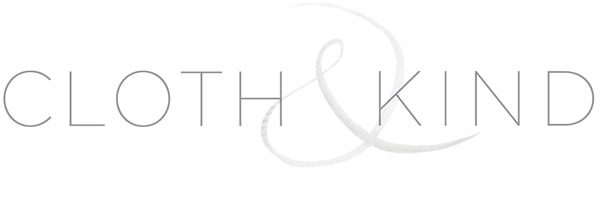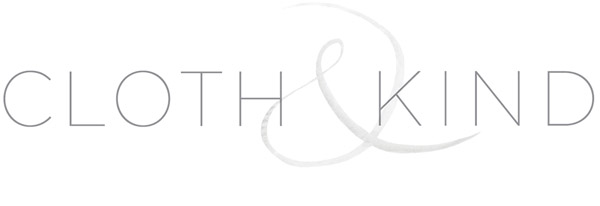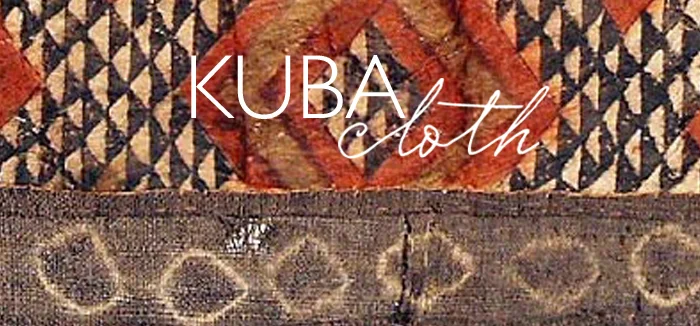prov-e-nance \ˈpräv-nən(t)s, ˈprä-və-ˌnän(t)s\noun. the place of origin or earliest known history of something.
ABOVE | Fabric Detail
Kuba Cloth is a rather magical kind of textile to me - it's organic and earthy, made in a primitive sort of a way, yet reads as quite modern when used just right in interior design. I've been drawn to it for a long time and have been collecting lovely vintage pieces that really strike my fancy whenever I stumble across them. Some I've used in my own home, like the one below, and others I'm saving for clients or to sell in CLOTH & KIND's online atelier which will be launching later this year (oh, if you'd like to be notified when the shop launches, please do sign up here).
ABOVE | My own vintage Kuba Cloth, mounted on nubby burlap and framed in a simple acrylic box, makes a total statement at the top of the stairs in my home.
Part of what makes ethnic textiles like Kuba Cloth so incredibly beautiful, at least to me, is knowing their history and understanding the time, technique, cultural significance and love that went into creating them. Is the same true for you? I hope so! It's because of this that I've created this new column. On a monthly basis Provenance will offer a scholarly nod to the history of iconic styles in textile & interior design. Since this is the first, please don't be shy about letting me know what you think and if you have any suggestions for styles you'd like to see covered in future Provenance posts.
ABOVE | Fabric Detail | Bedroom
ABOUT KUBA CLOTH Using the leaf of the raffia tree, the Kuba people of the Congo first hand cut, and then weave the strips of leaf to make pieces of fabric, often called raffia cloth. There are several different sub groups of the Kuba people and each group has different and unique ways to make the fabric - contributing to the wide variety of styles you'll find of this fabric. Some make it thicker, longer, shorter, or with different patches and/or colors. Each patch is symbolic and many times a piece has multiple meanings. When Kuba cloth originated it is thought that there were probably no patches used, but because the cloth is brittle it and tears easily, it's likely that the patches were used to repair the frequent tears. Later each patch developed a meaning and different patterns were uniquely arranged to tell a story. I love this... how the function ultimately became the form.
The process of making Kuba cloth is extremely time-consuming and may take several days to complete a simple piece. Both men and women contribute in equally important ways to the production of this fabric. First, the men first gather the leaves of the raffia tree and dye it using mud, indigo, or substances from the camwood tree. They then rub the raffia fibers in their hands to soften it and make it easier for weaving. After they've completed the base cloth the women set about embroidering it. They do this by pulling a few threads of the raffia fibers, inserting them into a needle running the needle through the cloth until the fibers show up on the opposite end. They use a knife and cut off the tops of the fibers, leaving only a little bit showing. Doing this hundreds and hundreds of times leads to the formation of a design. Kuba Cloth designs are seldom planned out ahead of time, and most of the embroidery is done by memory. In my opinion, this is part of what makes each imperfect piece so lovely and, clearly, so unique.
INCORPORATING KUBA CLOTH IN YOUR HOME Enchanted yet? There are so many ways that Kuba Cloth can be incorporated into interior spaces, and because of its dramatic design a single piece can make a major statement. Be sure to check out the shopping & inspiration resources below.
In addition to my own, I also wanted to share another Kuba Cloth wall hanging because I really, really love this as a way to showcase a long piece of this pretty fabric.
ABOVE | The Kuba Cloth above hangs in a long hallway of a gorgeous Streeterville condo in Chicago that belongs to a dear friend and former Condé Nast colleague of mine, Pam Dolby. It was placed by her talented designer Cindy Ilagan-Hengge, at the Kiran Design Group.
Admittedly, finding that one perfectly beautiful piece of vintage Kuba Cloth can be like searching for a needle in a haystack and the most stunning pieces are, not surprisingly, expensive. An alternative to finding an original piece of this fabric and transforming it for your space is to simply add a pillow or two. I've scoured the sources to share a few of my faves, some authentic Kuba Cloth and one awesome interpretation of it, complete with fun, shiny sequins, by Serena & Lily...
ABOVE | Mally Skok | Mark Alexander | Serena & Lily
Want to know more about Kuba Cloth and/or are you ready to shop? Check these out...
SOURCES | My Sources + More Information Africa Imports Kuba Textiles: An Introduction Wikipedia
SEE MORE | Kuba Cloth Pinterest Boards Inspired | Kuba ClothKuba ClothKuba Art Cloth
SHOP | Kuba Cloth Sources Africa and BeyondD. Bryant ArchieHaba Na Haba Hamill Tribal Textiles Kathleen TaylorL'Aviva Home Michael Donaldson AntiquesThe African Fabric ShopThe Loaded Trunk
Do you have a photo or story to share of how you've used Kuba Cloth in an interior space? Comment below and/or email it to info(at)clothandkind(dot)com and I'll post my favorites to my Kuba Cloth board on Pinterest, which will continue to grow and be an evolving resource for all things Kuba Cloth.











